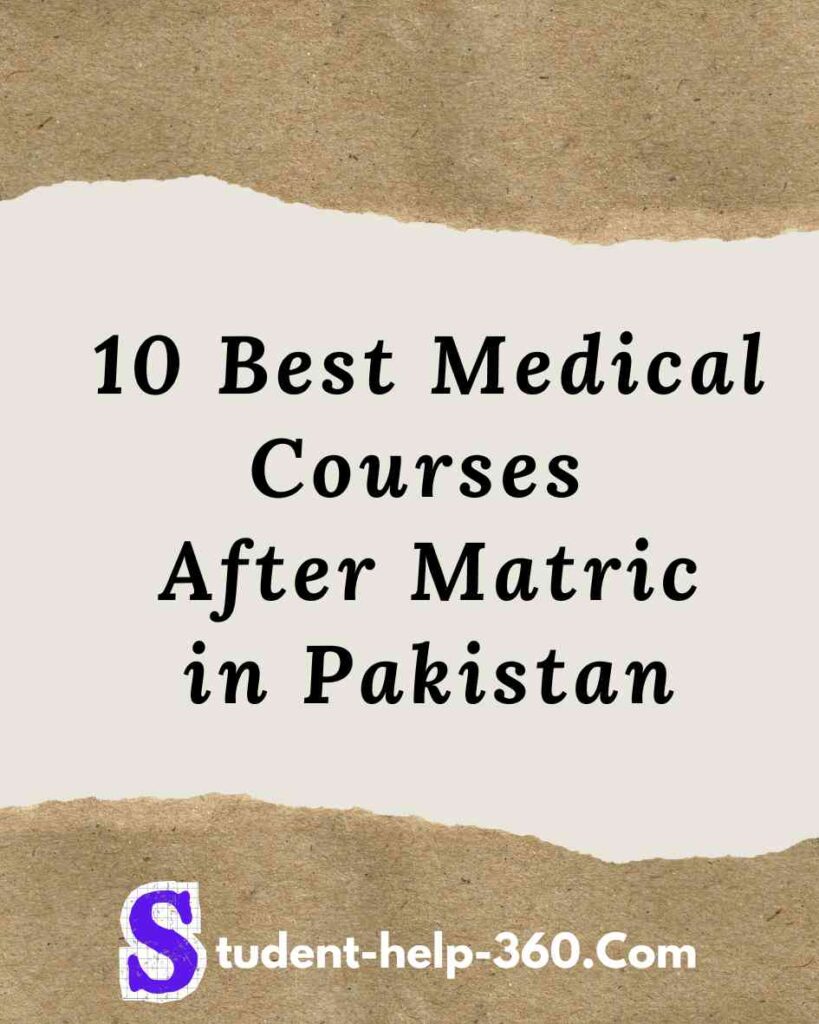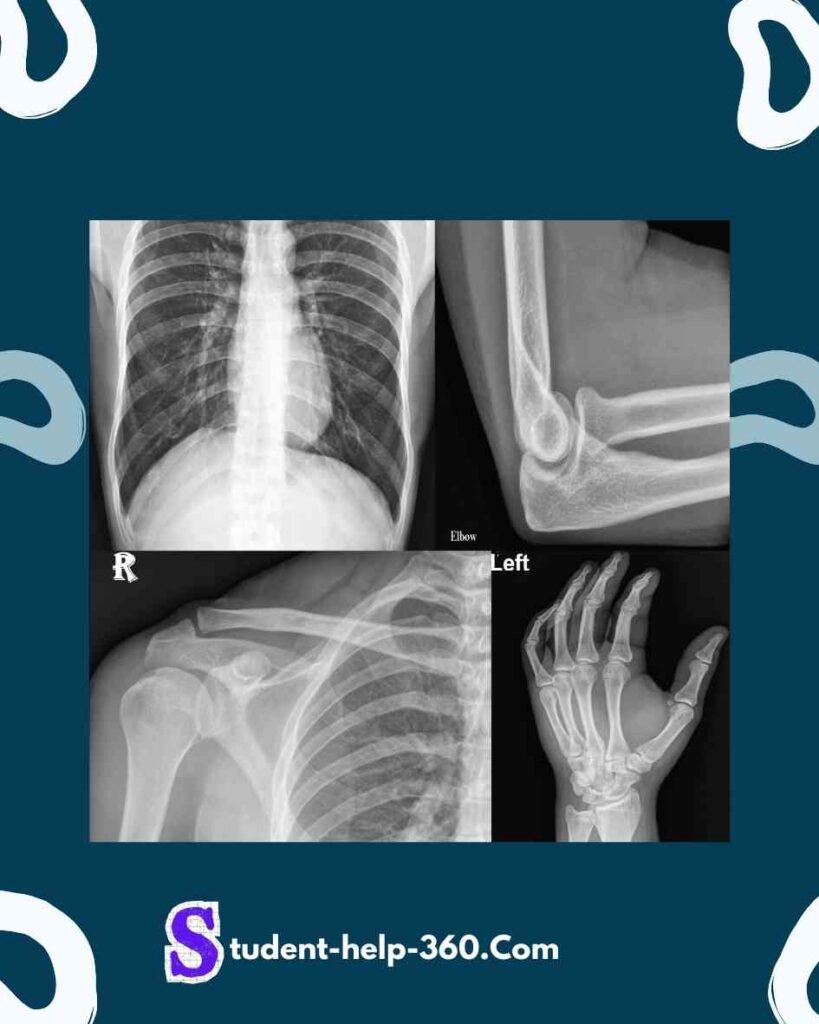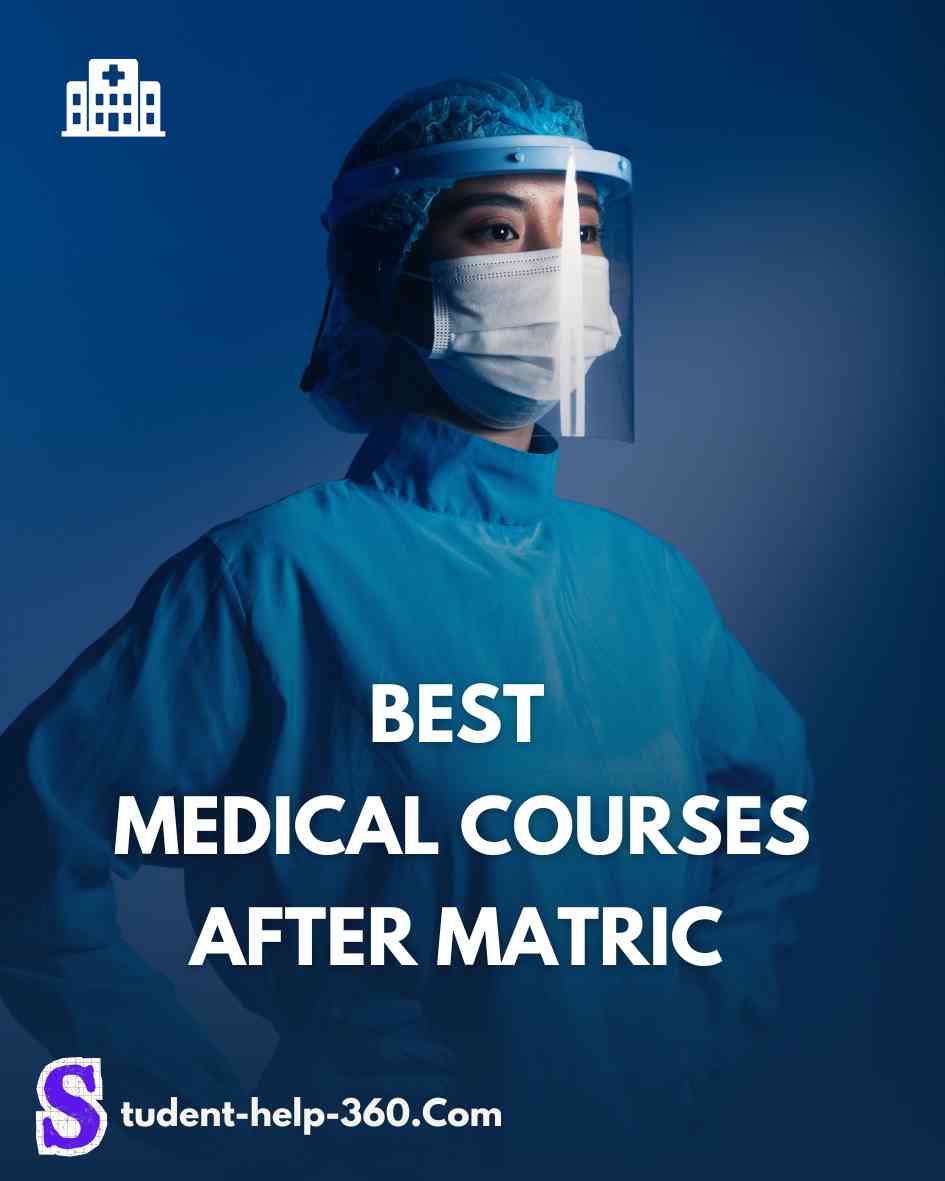“Affordable and High-Scope Medical Courses for Matric Students in Pakistan“

Table of Contents
Why Choose Medical Courses After Matric?
Dear students,
You might like :
Scope of Biotechnology
Have you ever thought about your future after matric? Choosing the right path is important, and medical courses after matric can be a smart choice. Let me explain why.
Top 4 Reasons :
- A Path to a Bright Career
- Quick and Practical Learning
- Affordable and Accessible
- High Demand for Healthcare Workers
TIP ONLY FOR YOU
WITH INCREASE TREND IN TECHNOLOGY AND AI . YOU MAY ALSO CONSIDER COMPUTER COURSES BESIDE MEDICAL COURSES .
A Path to a Bright Career

After matric, medical courses lead to rewarding careers. The healthcare industry is increasing, creating many jobs. Beginning your medical career with entry-level medical diplomas or certificates. Paramedical courses teach medical assistant, lab technician, and emergency services skills.
Quick and Practical Learning
Medical diplomas after matriculation are brief and focused, unlike academic programs. Vocational medical training programs give real-world skills. Start making money without waiting years. After the course, you can work as a skilled professional.
Affordable and Accessible
Matriculated kids can afford medical education. Allied health and technical medical certificates are cheaper than medical degrees. Many localities offer similar services, making them accessible to everyone.
High Demand for Healthcare Workers

there is high demand of healthcare workers both in government and private hospitals .
Eligibility Criteria for Medical Courses After Matric
Let me explain the eligibility criteria for medical courses after matric in simple terms.
Looking For Best Chemistry Tutor in Pakistan ( Chick it out )
Who Can Apply for Medical Courses After Matric?
To join medical courses, you must meet some basic requirements.
Students who have completed their matriculation with science subjects (Biology, Chemistry, and Physics) can apply.
There are other requirements also lets dive deeper .
Academic Qualifications for Medical Diplomas
You need good academic performance. The minimum marks for medical courses after matric are usually 50% to 60%. Some courses might need even higher grades, so check the specific requirements. Schools and institutes look at your matriculation results to decide if you qualify.
Admission Process for Medical Education
The admission process for medical education is simple.
First, find out which course you want to take, like nursing, pharmacy, or lab technician.
Then, submit your documents, including your matric certificate and other required papers.
Prerequisites for Paramedical Training
Paramedical courses are very popular. To meet the eligibility for paramedical courses, you should focus on science subjects in matric. These courses include training for roles like medical technicians or healthcare assistants. Different courses may have different medical diploma prerequisites, so always check the details.
Other Important Factors
- Marks Percentage Needed for Medical Courses: Most institutes require at least 50%, but some demand higher.
- Age Limit for Medical Field Admissions: Generally, you must be between 15 and 25 years old. However, this depends on the course and institute.
- Vocational Healthcare Course Requirements: These focus on practical skills, so a science background is essential.
10 Medical Courses After Matric in Pakistan
There are many exciting medical courses after matric in Pakistan that can lead to rewarding careers. I’ll explain ten popular options and what you can learn in each.
1. Medical Laboratory Technician Course

If you’re curious about medical tests and equipment, the medical laboratory technician course is a great choice. This program teaches you how to handle laboratory equipment and perform tests like blood analysis and microbiology techniques.
Through lab technician training, you’ll learn skills such as:
- Collecting and analyzing samples.
- Using diagnostic machines.
- Preparing medical reports.
Career Scope: Clinical lab technicians work in diagnostic labs, hospitals, and research centers. With advancements in healthcare, this role is in high demand.
2. Dispensing Pharmacy Course
Do you enjoy learning about medicines? The pharmacy dispensing course helps students become pharmacy technicians. This course focuses on medication dispensing in Pakistan and how to ensure patient safety.
Key topics include:
- Basics of pharmacology.
- Handling prescriptions.
- Understanding over-the-counter medicines.
Career Scope: You can work in retail pharmacies, hospitals, or as a pharmaceutical assistant. Jobs in this field are increasing as healthcare expands in Pakistan.
3. Radiology and Imaging Technology
If you’re fascinated by X-rays and imaging machines, consider the radiology technician course. It focuses on imaging technology training, including operating diagnostic machines like X-rays, MRIs, and CT scanners.

Important skills include:
- Understanding radiographic techniques.
- Performing diagnostic imaging procedures.
- Ensuring patient safety during scans.
Career Scope: Radiology technicians are essential in hospitals and diagnostic centers. This career offers high earning potential and stability.
4. Operation Theatre Technician (OTT)
Do you want to work in surgical settings? The operation theatre technician course prepares students for assisting in operations. You’ll learn about sterilization techniques, surgical tools, and operation theater roles.
Key skills include:
- Preparing the operation room.
- Assisting surgeons during procedures.
- Maintaining surgical equipment.
Career Scope: Operation theater technicians are in demand in hospitals and surgical centers. This role is critical to ensuring smooth operations.
5. Nursing Assistant Program
If you love helping people, the nursing assistant course might be for you. This program focuses on patient care training, including hygiene management, bedside care, and home care nursing.
What you’ll learn:
- Monitoring patient health.
- Providing basic nursing support.
- Managing hygiene and comfort.
Career Scope: Nursing assistants are needed in hospitals, clinics, and home care services. It’s a fulfilling job where you make a real difference in people’s lives.
6. Physiotherapy Technician Course
Interested in physical therapy? The physiotherapy technician course teaches you about rehabilitation techniques and patient care. It’s perfect for students who want to help people recover from injuries or illnesses.
Key topics include:
- Therapeutic exercises for recovery.
- Using rehabilitation equipment.
- Assisting patients during therapy sessions.
Career Scope: Physiotherapy technicians work in rehabilitation centers, hospitals, and fitness clinics. The demand for this role is growing due to an aging population and increasing awareness of physical health.
7. Dental Technician Program
If you like working with your hands, the dental technician course might be ideal. This program focuses on dental technology training, including creating and repairing dental prosthetics.
What you’ll learn:
- Making crowns, bridges, and dentures.
- Assisting dentists with technical tasks.
- Understanding dental healthcare basics.
Career Scope: Dental technicians work in dental labs, clinics, and hospitals. This is a specialized field with great earning potential.
8. Community Health Worker (CHW) Course
Do you want to help people in your community? The community health worker course trains students to promote public health and awareness. You’ll learn how to educate people about diseases and preventive care.
Key topics include:
- Conducting health awareness programs in Pakistan.
- Teaching basic hygiene practices.
- Helping rural areas with healthcare access.
Career Scope: CHWs work in NGOs, healthcare centers, and government health projects. This role is crucial for improving public health.
9. Health and Safety Officer Training
If you’re interested in workplace safety, the health and safety officer course is for you. This course covers occupational safety training, including risk assessment and emergency response.
Key skills include:
- Identifying workplace hazards.
- Developing safety protocols.
- Training employees on safety measures.
Career Scope: Health and safety officers are needed in industries, hospitals, and schools. This role is becoming more important in Pakistan as organizations prioritize employee safety.
10. First Aid and Emergency Care Training
Do you want to be prepared for emergencies? The first aid training course teaches life-saving skills like CPR, trauma handling, and wound management techniques.
What you’ll learn:
- Handling injuries and accidents.
- Performing basic life support.
- Responding to natural disasters.
Career Scope: First aid and emergency care providers work in hospitals, rescue services, and disaster response teams. It’s a vital role that saves lives.
How to Choose the Right Medical Course After Matric
Are you wondering how to pick the right medical course after matric? Don’t worry; I’m here to guide you step by step. Choosing the right path is very important for your future, so let’s explore how you can make the best choice.
Understand Your Interests
The first step is to know what you enjoy. Think about your favorite subjects in matric. Did you like Biology or Chemistry? If yes, then medical courses might be perfect for you. Ask yourself what you see yourself doing in the future. For example, do you want to help people as a nurse, work in a lab, or become a pharmacist? Your passion will help you decide.
Explore Medical Courses After Matric in Pakistan
There are many medical courses after matric in Pakistan. Some focus on technical skills, while others prepare you for higher studies. Popular options include:
- Nursing diploma
- Medical lab technician courses
- Pharmacy assistant training
These courses have a shorter duration and can lead to quick employment. If you plan to continue your studies, you can choose pre-medical programs that prepare you for MBBS or BDS.
Compare the Best Medical Fields After Matric
It’s important to compare options. The best medical fields after matric depend on your goals. If you want a steady job, paramedical courses are great. For example, lab technicians and healthcare assistants are in high demand. On the other hand, if you aim for advanced degrees, pre-medical programs are a better choice.
Check the Scope of Medical Courses
Always consider the scope of medical courses after matriculation. This means thinking about future job opportunities. For example:
- Healthcare is growing fast, so fields like nursing and pharmacy have a bright future.
- Medical technician roles are also expanding due to advanced technology.
By understanding the market demand, you can pick a course that offers stability and growth.
Seek Guidance and Make a Plan
If you feel confused, seek guidance for matric students in medical fields. Talk to teachers, career counselors, or family members. They can provide valuable advice. Once you have a clear picture, create a plan. List the courses, institutes, and admission requirements to stay organized.
Build Your Future in Healthcare
Choosing the right course sets the foundation for your future in healthcare after matric. Whether you choose a medical diploma or a pre-medical program, work hard and stay focused. Healthcare careers are rewarding, both personally and financial
Choosing the Best Course for You
Now that you know about these ten courses, how do you choose? Here are some tips:
- Know Your Interests: Think about what excites you. If you like working with machines, radiology might be a good fit. If you enjoy helping others, nursing could be the right choice.
- Check the Scope: Look at job opportunities in the field. For example, lab technicians and pharmacists have strong demand in Pakistan.
- Consider Your Strengths: If you’re good at technical tasks, consider dental or radiology training. If you’re more social, CHW or nursing roles might suit you better.
- Talk to Experts: Seek advice from teachers, family members, or career counselors.
Comparison of Medical Courses: Scope vs. Affordability
Choosing a medical course after matric can feel tricky. You need to think about both the scope vs affordability in medical courses. Let me help you understand how to compare these factors.
Scope of Medical Courses
The scope of medical courses is about the future opportunities they offer. Some courses, like nursing diplomas or lab technician programs, lead to quick jobs. These job-oriented medical programs are in demand in hospitals and clinics. High-scope courses often mean better salaries. For example, healthcare professionals in Pakistan earn competitive salaries, especially in growing fields like pharmacy or radiology.
Affordability in Medical Courses
On the other hand, you must consider affordability. Cost-effective medical training programs are available in many institutes. Short-term diplomas like pharmacy assistant or medical technician courses are more affordable than long-degree programs. These budget-friendly medical certifications save you money while providing good career opportunities.
High ROI Medical Courses
It’s important to think about the return on investment in medical education. For instance, some affordable healthcare courses with high scope can give you quick employment with good salaries. Paramedical diplomas are excellent examples, as they are both affordable and job-oriented.
Balancing Scope and Cost
When deciding, think about the cost vs benefit analysis of healthcare education. Ask yourself: Does the course fit my budget? Will it provide a stable career? A balance between affordability and future prospects is key.
Affordability of Medical Courses in Pakistan
Many of you want to join medical courses but worry about the costs. Let’s talk about the affordability of medical courses in Pakistan and explore ways to make them easier on your pocket.
Low-Cost Medical Institutes in Pakistan
Pakistan has many low-cost medical institutes offering quality education. Government colleges often have lower fees compared to private ones. These institutes provide good training without putting a big burden on your finances. Some examples include public nursing schools and vocational healthcare centers.
Medical Scholarships and Financial Assistance
For students facing financial challenges, there are medical scholarships in Pakistan. These scholarships help cover tuition and other expenses. Many institutes also offer financial assistance for medical education based on merit or need. Always check for available funding opportunities before applying.
Budget-Friendly and Cost-Effective Programs
If you’re looking for budget-friendly medical courses, consider diploma programs. These courses are short, affordable, and job-oriented. For example, pharmacy assistant and medical technician courses are good options. They offer a great balance between cost and career opportunities.
Fee Structures and Funding Options
Before applying, review the fee structures for medical courses. Public institutes usually have fixed, low fees, while private ones may offer payment plans. Additionally, organizations like HEC and NGOs provide funding opportunities for medical students to support your dreams.
Career Opportunities After Completing Medical Courses
Hello students! Completing a medical course opens the door to many exciting career paths. Let me guide you on the opportunities waiting for you in this rewarding field.
Career Opportunities After Medical Courses
After completing a medical course, you can work in different areas of healthcare. From hospitals to clinics, the demand for skilled workers is always high. There are plenty of medical jobs in Pakistan, including positions in government and private hospitals. These jobs offer stability, good pay, and chances to grow.
Jobs in Government Hospitals
Government hospitals provide secure jobs with benefits like pensions and allowances. If you want to serve your community while enjoying career growth, this is a great choice. These roles often include positions as nurses, lab technicians, or pharmacy assistants.
Private Hospital Job Opportunities
Private hospitals and clinics also hire skilled medical workers. These jobs often pay more and offer advanced equipment to work with. Whether you are a medical technician or a healthcare assistant, private hospitals provide excellent learning experiences.
Freelancing and Self-Employment in Medical Fields
If you prefer flexibility, you can explore freelancing in healthcare. Many professionals choose self-employment in medical fields by starting their own clinics or labs. This option lets you be your own boss and work at your own pace.
International Healthcare Careers
There is a global demand for medical skills, making international healthcare careers a strong option. Countries like the UK, Australia, and the Middle East seek medical professionals. These jobs often provide better salaries and career growth.
Future Prospects for Medical Course Graduates in Pakistan
Hello students! Let’s talk about the future prospects for medical course graduates in Pakistan. The healthcare sector in our country is growing rapidly, offering exciting opportunities for those entering this field.
Growth of Healthcare Sector in Pakistan
The growth of the healthcare sector in Pakistan means more hospitals, clinics, and diagnostic centers are opening. This expansion creates countless job opportunities. From nurses to lab technicians, medical course graduates are in high demand.
Impact of Technology on Medical Jobs
Technology is changing the way healthcare works. Technological innovations in medical careers are introducing advanced tools like AI in diagnostics and robotic surgery. This opens doors for graduates to work with cutting-edge equipment and develop specialized skills.
Job Opportunities in Pakistan’s Healthcare Sector
The rise of private hospitals and telemedicine has increased job opportunities in Pakistan’s healthcare sector. Roles like pharmacists, medical technicians, and healthcare assistants are essential. Graduates with the right training can secure well-paying and stable jobs.
Emerging Trends in Healthcare Careers
New trends are shaping the future. Digital healthcare, for instance, allows professionals to work remotely. These advancements in medical technology and jobs show that the field is always evolving. By staying updated, graduates can build long-term careers.

3 thoughts on “2025| 10 Best Medical Courses After Matric in Pakistan”